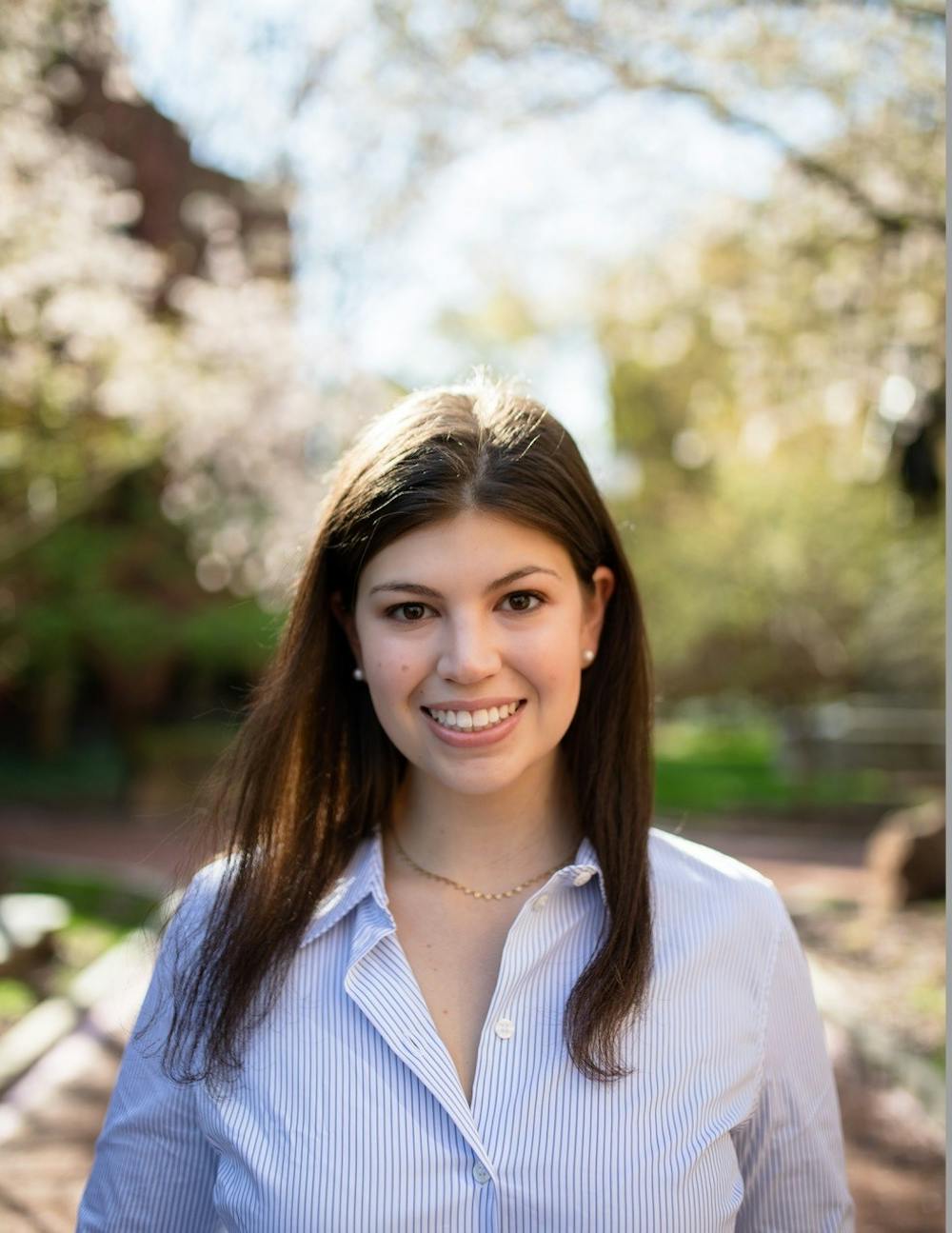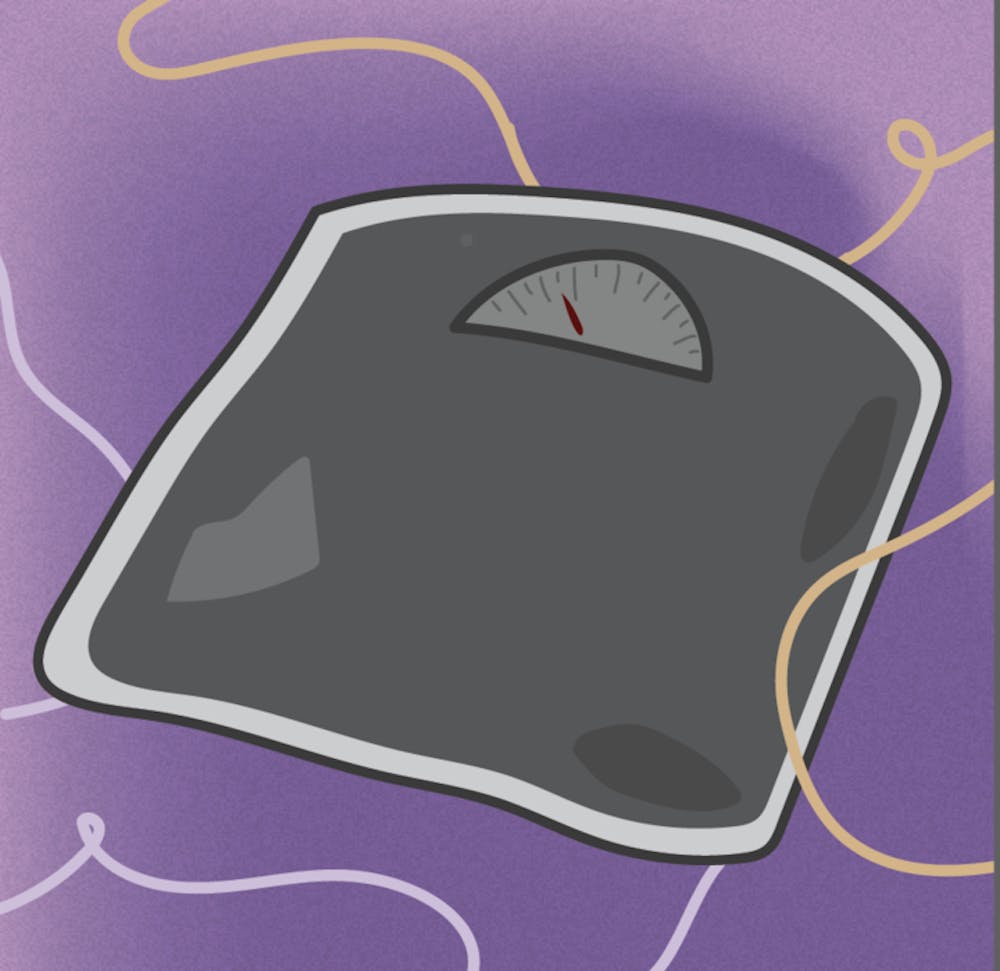Content Warning: The following text mentions eating disorders, disordered eating behaviors, and mental illness, which can be disturbing or triggering for some readers. Please find resources listed at the bottom of the article.
“There are so many things in college that seem small but are accepted as normal, like people not eating before they go out so they can get drunk faster, or little comments about how someone thinks they need to go for a run because they drank too much last night. Those are things that have become so accepted in college as normal, and they’re just not.” – Sophia Glinski (C ‘23)
We hear these comments comments about food all the time—many of us probably make them ourselves.
“I ate too much yesterday, I’m not going to have breakfast.”
“I’m wearing a really tight dress tonight. I shouldn’t eat dinner.”
“I ate so much drunk food, it’s a good thing I threw up after.”
These remarks and behaviors are so commonplace, so accepted, that it's easy to overlook and difficult to acknowledge that they’re actually unhealthy.
Sophia and Audrey Singer (C ‘23) have recognized this reality. Though there are clubs at Penn that provide support for students struggling with diagnosable eating disorders, such as Project HEAL, Sophia and Audrey noticed that there is no organization at Penn that makes promoting body positivity or body acceptance its mission. Neither of them have suffered from a diagnosed eating disorder, but both have experienced trouble with body image and body insecurity—as many college students do.

They saw a need in the Penn community for an organization that addresses body acceptance and met it by starting Body Positive UPenn.
Body Positive UPenn is based on The Body Positive, a national organization that focuses on body acceptance and self–love. The Body Positive has five core competencies that Body Positive UPenn adopted: reclaiming your health, practicing intuitive self–care, cultivating self–love, declaring your own authentic beauty, and building community.
Body Positive UPenn’s mission is to help student participants develop healthier relationships with their bodies. They do this through an eight–week curriculum that was developed by the national organization. By the end of the eight weeks, the goal is for participants to have a greater acceptance of who they are and what they look like.
“It’s scary to open up, but we go slow. We don’t jump into your most intimate experiences right away. We start by talking about societal messages at first, and people have a chance to bond and reflect on shared experiences that they’ve had,” Sophia says.
The main goal of the group is to build a community of support. This community is intended to help participants understand that they’re not alone in negative feelings about their bodies and to provide a space for them to discuss body insecurity.
Christina Miranda (C ‘21) and Amanda Moreno (C ‘21) introduced the two rising juniors to The Body Positive. Christina and Amanda started a Philadelphia–area chapter, for which they received the President’s Engagement Prize.
Sophia is a psychology major who is interested in sports psychology, while Audrey is a Health and Societies major. Both are passionate about eating disorder (ED) awareness—they met through Project Heal, an organization that focuses on ED awareness and raising money for ED treatment. They are now co–leads of Project Heal, a responsibility that they took on simultaneously with Body Positive UPenn.
“Sophia and I were really passionate about getting a group started on Penn’s campus, particularly given the timing. We noticed so many issues popping up because of the pandemic. So many college students already struggle with eating and body image issues, and every single aspect of the pandemic exacerbates that,” Audrey says.

They spent their winter break learning about The Body Positive’s five core competencies and their lessons and adapting them to fit the needs of Penn students. This was in preparation for their pilot program, which took place during the spring semester and was composed of a group of seven female student–athletes.
Audrey and Sophia were the only trained group facilitators at the time which limited the number of students that they were able to accept into the pilot program.
However, the organization is growing. It will have two more trained facilitators in the fall and will welcome two groups of students to participate. One group will be run by athletes and will be limited to athlete participants, and another will be run by Audrey and Sophia. The latter group will be open to any and all Penn students that are interested.
Sophia acknowledges the many ways in which the athlete experience is unique: “One of the major jobs of an athlete is to be hyper–focused on your body because it is for your sport. That can make it harder to accept and love yourself as you are because you’re trying to improve.”
This is much of the reason that their first group was limited to athletes, and why they want to continue to have an athletes–only group. However, both girls received interest in Body Positive UPenn from non–athletes throughout the semester, and they’re excited to embark on the organization's next chapter by starting a group that welcomes all Penn students.
Several students were skeptical upon starting the program. They were unsure whether it would benefit them, and whether it was worth their time. But Sophia describes how, ironically, the participants that were most hesitant about the program at the beginning were the most moved and impacted by the end.
“We know student athletes are incredibly busy, and we didn’t require the athletes to come every week. What’s interesting is that every single person that joined came every single week. I think it speaks to how much of an impact the group had on them and how much they enjoyed having just an hour of their night on Mondays to talk about this and have the space to express themselves,” Sophia says.
Participants were not the only ones left impacted by the program—Audrey and Sophia were both affected themselves.
Much of Sophia’s motivation to start Body Positive UPenn was spurred by her own personal struggles with body insecurity in the past. “It's cliché, but when I did the training for the program myself I had an epiphany. It finally all made sense to me. All of the messages that people had been telling me—to love myself as I am and challenge cognitive distortions—I’d always kind of brushed them off until I did the training and went through the activities and the exercises myself. I had this realization that I can accept myself as I am, and I really wanted to help other people also come to that realization,” she says. The photograph below is from a photoshoot that Sophia did after learning to love herself and her body.

Audrey has also experienced changes in her eating habits, body image, and confidence, but the impact of Body Positive UPenn on her life extends beyond this—her career aspirations have entirely shifted: “I was definitely nervous to be leading a group…but it ended up being so rewarding. I was pre–med when I went into the semester, and I am no longer pre–med. I enjoyed this work so much that I realized I want whatever I do as a career to feel the same way.”
Audrey and Sophia have been thrilled with the impact of the organization thus far. The feedback and testimonials they’ve received from participants are glowing.
“Truly, this group has changed my life for the better and came into my life at perfect timing in my recovery and learning to love, accept, and embrace the feeling of fueling my body and the changes that come with it. This has been the first space—outside of my family—that has allowed me to share my story, struggles, small wins, insecurities, emotions, and most importantly embrace my growth! Thank you so much!!!” – Anonymous
Campus Resources:
The HELP Line: 215-898-HELP: A 24–hour–a–day phone number for members of the Penn community who seek help in navigating Penn's resources for health and wellness.
Counseling and Psychological Services: 215-898-7021 (active 24/7): The counseling center for the University of Pennsylvania.
Student Health Service: 215-746-3535: Student Health Service can provide medical evaluations and treatment to victims/survivors of eating disorders, regardless of whether they make a report or seek additional resources.
Reach–A–Peer Hotline: 215-573-2727 (every day from 9 p.m. to 1 a.m., texting available 24/7): A peer hotline to provide peer support, information, and referrals to Penn students.

